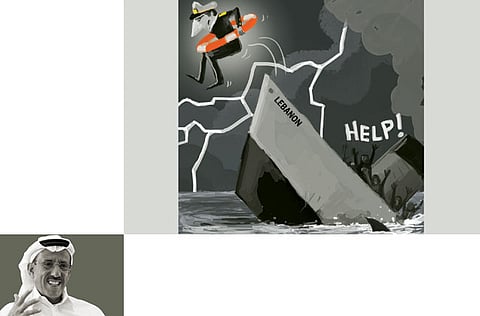Lebanon will sink without a competent captain
Lebanon’s problems can be resolved if only the Lebanese admit they need help

The only continuity in Lebanon is its protected cedar trees. For me, the fact that the Lebanese seem unable to put their house in order is a source of frustration because this country, blessed with nature’s finest bounty, has potential that citizens of other countries would die for.
I lost my heart to Lebanon in the 1970s and while looking up some of my old friends in Beirut during the 1990s, they encouraged me to take-in the country’s amazing diversity with a tour. It was then that I decided to inject the hospitality industry with substantial financial investment.
That was hardly a sound business decision, though, as I was driven by emotion. I wanted to help the Lebanese prosper by providing business opportunities and jobs.
I hoped they would purge themselves of sectarian divisions, demand a democratic political system, bolt the door to damaging foreign influences — and reject any leader willing to sacrifice Lebanon, whether for ideological reasons, personal benefit or foreign affiliations.
How wrong I was! Their ingrained loyalties to political and religious figures who have failed to lead them in the right direction and out-of-date political systems are imprisoning them in a time capsule.
I cannot count the number of times I have advised them to free themselves from the diktats of sectarian heads with less than patriotic agendas. No matter their faith or social status, they would often tell me that they were used to living this way.
Most settle for surviving from day to day in an atmosphere of insecurity when the majority of people around the world without a stable future would be eager for change. To be fair, the Lebanese have suffered more than most from a series of foreign occupations and internal/external conflicts. But isn’t it time that they moved away from their crisis-mode way of thinking to one that will be more productive in the long term?
The crux of Lebanon’s problems is its confessional system of governance inherited from the French which promotes disunity. Its mandatory Maronite president, Sunni prime minister and Shiite parliamentary speaker often have competing agendas, loyalties and programmes that undermine the personality of the government. Each time a leader tries to solve the nation’s economy or security problems, he is blocked by political parties.
It doesn’t help that there is a disparity between parties in terms of strength. Some are bent on moving the government in any direction they choose; others genuinely try to make things better, but are virtually impotent. Then there are those who sell out their country to foreign powers as a proxy battlefield.
Such inter-party differences of opinion do not attract investor confidence that leads to job creation — and are no recipe for the harmonious existence that most Lebanese crave. These never-ending political stalemates make me nostalgic for the 1970s when president Sulaiman Franjieh was at the helm. That was a time when Lebanon had an experienced captain and enjoyed law and order.
At this moment in time, Lebanon’s economy is on the brink according to the head of the Lebanese Industrialists Association, Nemat Frem. “We are on the verge of collapse,” he announced. “Our public debt has reached $60 billion (Dh220.68 billion) while the Gross Domestic Produce remains at $41 billion.
The head of Beirut’s Chamber of Commerce, Mohammad Choukeir, blames politicians for having “turned a deaf ear” to the economy’s deterioration and the drying-up of foreign investment. He warns of a worsening situation if the government does not quit “endless bickering” and take concrete action to tackle rising unemployment, soaring fuel prices, power cuts and improve infrastructure.
The Lebanese love to portray themselves as intelligent, but their collective intelligence is sadly lacking. As the pulse of the Arab world, Lebanon is not expendable. If the Lebanese do not rally behind a wise captain, regardless of his faith or personal allegiances — in other words, the best man for the job — then its sincere Arab friends should send in the lifeboats to save the people who clearly are not sufficiently politically mature to save themselves. And since the Arab League has failed to rescue Syrians, the GCC states should step in to save the day.
The GCC should be tasked by the Lebanese to supervise the country’s transition from a confessional system to a real democracy led by a robust decision-maker; a system that can empower the people of Lebanon to lead fruitful lives within secure parameters, rather than be blown apart like straws by the whims of politicians.
Lebanon’s problems could be resolved if only the Lebanese would admit they need help and request the GCC’s assistance so our wise, elder statesmen can use their proven powers of alchemy that fuelled the transformation of Gulf states, allowing this fragrant land to bloom again.
But let’s be clear. I’m not advocating interference in Lebanese sovereignty. I’m talking about the obligation of friends to help each other out in the way Saudi Arabia has recently stood by Bahrain.
As someone who cares, I would appeal to the people of Lebanon to invite our GCC leadership to offer their help, as I’m certain they would readily provide it.
Khalaf Al Habtoor is a businessman and chairman of Al Habtoor Group.
Sign up for the Daily Briefing
Get the latest news and updates straight to your inbox



